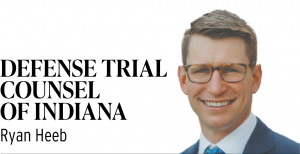Subscriber Benefit
As a subscriber you can listen to articles at work, in the car, or while you work out. Subscribe Now This is a hyperconnected world. Emails, text messages, social media posts, instant messages and phone calls pour into our cellphones, computers, tablets and watches all hours of the day. Rings, pings and vibrations draw our attention to those communications and away from the task we are working on or the conversation we are holding. That impairs the substantive legal work we must perform. Reviewing or responding to those notifications is “shallow work,” which undermines our “deep work.”
This is a hyperconnected world. Emails, text messages, social media posts, instant messages and phone calls pour into our cellphones, computers, tablets and watches all hours of the day. Rings, pings and vibrations draw our attention to those communications and away from the task we are working on or the conversation we are holding. That impairs the substantive legal work we must perform. Reviewing or responding to those notifications is “shallow work,” which undermines our “deep work.”
Cal Newport, the author of “Deep Work: Rules for Focused Success in a Distracted World,” writes, “Knowledge workers dedicate too much time to shallow work — tasks that almost anyone, with a minimum of training, could accomplish (e-mail replies, logistical planning, tinkering with social media, and so on). This work is attractive because it’s easy, which makes us feel productive, and it’s rich in personal interaction, which we enjoy (there’s something oddly compelling in responding to a question; even if the topic is unimportant). But this type of work is ultimately empty. We cannot find real satisfaction in efforts that are easily replicable, nor can we expect such efforts to be the foundation of a remarkable career.”
This certainly rings true for the practice of law. But how can lawyers stay engaged in deep work when notifications repeatedly invite them to engage in shallow work?
1. Close the email and silence the notifications
Each email, message and phone call notification interrupts your attention and takes you away from the task at hand. When writing a brief or engaging in deeper analysis of an issue, close the email, put the phone on “do not disturb” and close the door. This minimizes the distractions and gives a better chance of diving deeply into an issue.
2. Create, maintain and respect boundaries
If writing a response brief, only write the response brief. If drafting discovery requests or responses, only draft the discovery requests or responses. Do not take the phone call. Do not answer the email. Politely ask the drop-in visitor if the visit can be postponed. Respect the boundaries you set and expect others to do the same.
Conversely, if a colleague — partner or associate — is trying to focus on a task, avoid interrupting unless it’s an emergency. You reap what you sow! Ask, “Is now a good time?” And when asked that question, answer it bluntly and honestly.
3. Slow down
This is a hard lesson for an associate to learn. Most of the time, an immediate response to an email or Teams message is not required. It is better to keep focused on the task, complete it, then respond. Work-product will improve and allow for a better, more thoughtful response to the message or question.
4. Focus on quality, not quantity
The number of emails sent or messages answered do not (always) translate into quality legal work. The legal profession requires the analysis, comprehension and solution of complex issues. Part of that does include effective communication with others, but the focus should first be on the quality of the product, and only then the means of communicating/transmitting it. By focusing on quality rather than quantity, there will be fewer mistakes and higher quality legal work.
These are not novel ideas. They are simply a reminder to think twice about immediately responding to the Teams message from an associate or screeching to a halt in the middle of a brief to check email. Of course, there are times when it is impossible to follow this plan; there are emergencies, after all. But the goal should be to dedicate more time to the deeper-level analysis required to represent clients.
The reality is that the legal profession requires both deep and shallow work. A barrage of communications — particularly electronic communications — often leads to shallow work, leaving deep work untouched.
Dedicate more time to the larger substantive legal tasks at hand and less to the shallow work.•
__________
Ryan Heeb is an attorney in the Bloomington firm of Bunger & Robertson and is a member of the Defense Trial Counsel of Indiana. Opinions expressed are those of the author.
Please enable JavaScript to view this content.
